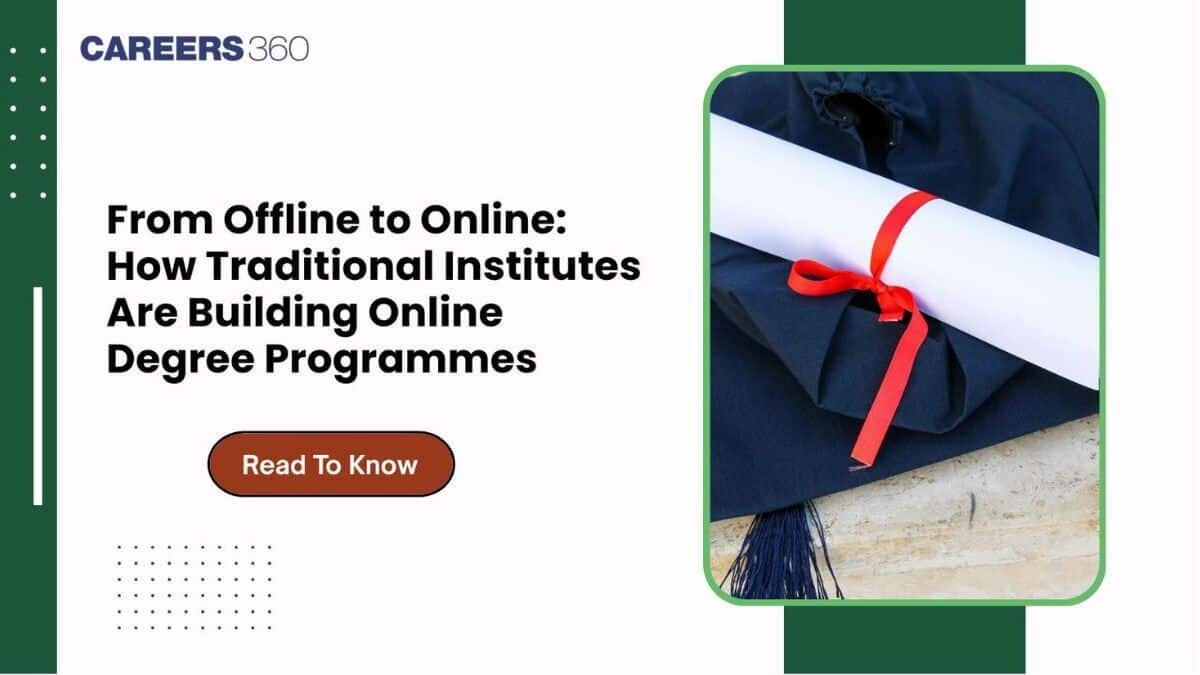From Offline to Online: How Traditional Institutes Are Building Online Degree Programmes
Online education in India has gained significant popularity in recent years, transforming how students learn and access higher education. While initially limited in awareness, digital learning became essential after the 2019 pandemic, requiring universities to quickly adopt online degree courses. These institutions are provided in several disciplines such as management, humanities, computer applications, and sciences.
This Story also Contains
- Why Traditional Universities Are Going Online
- Building Digital Infrastructure
- Curriculum Redesign for Digital Classrooms
- Faculty Upskilling and New Academic Roles
- Enhancing the Student Experience
- Strategic Partnerships and Regulatory Compliance
- Key Challenges in Digital Transformation
- Case Studies: Leading the Way
- The Future of Higher Education in India

The rise of online degree programmes has made quality education accessible to students in both metropolitan and smaller towns, eliminating the need to relocate. With approvals from the University Grants Commission - Distance Education Bureau (UGC-DEB), several established universities offer fully online degrees, combining flexibility, inclusivity, and future-ready learning experiences.
Why Traditional Universities Are Going Online
The motivation behind this transition goes beyond temporary change.
- Expanding access: Online education removes geographical barriers, enabling learners from across India to enrol.
- Diversifying enrolment: With no classroom capacity limitations, universities can increase their student intake.
- Remaining competitive: The growing presence of EdTech platforms and global universities has encouraged traditional institutions to innovate.
This digital transformation in higher education helps universities build their brand and future-proof their offerings.
Also Read: NMIMS Online BBA Admission 2026 Registration Begins - Last Date, Application Link, Fees
Building Digital Infrastructure
The universities are setting their foot in digital infrastructure to provide a better and smoother experience for their students.
LMS and Tech Tools: A strong Learning Management System (LMS) is important for online learning. It hosts live classes, recorded sessions, assignments, discussion forums and progress tracking.
Security and Scalability: Institutes are strengthening cybersecurity systems to protect academic data. Scalable platforms ensure smooth learning experiences even during peak times such as exams and assignment submissions.
AI and Analytics: Many universities are integrating AI-powered tools to personalise learning, monitor student performance and provide targeted support.
Curriculum Redesign for Digital Classrooms
Traditional syllabi are being restructured into modular, outcome-driven online formats.
Short, topic-focused modules for better learning retention
Interactive quizzes, live projects and assessments
Greater focus on industry-relevant skills and employability
This modern curriculum ensures academic quality while keeping students engaged.
Faculty Upskilling and New Academic Roles
Teaching online requires new skills. Universities are investing in faculty development programmes to train educators in:
Using digital teaching tools effectively
Engaging students through interactive online sessions
Designing assessments suitable for virtual delivery
Additionally, roles such as instructional designers and learning experience managers are becoming vital in online programme delivery.
Enhancing the Student Experience
Online learners expect more than just recorded lectures.
The universities also focus on Virtual counselling, academic mentorship, and peer interaction to help replicate campus support.
Flexible assessments and secure proctoring maintain academic integrity.
Online clubs, discussion forums and cohort-based projects foster a sense of community.
This focus on learner support ensures students remain motivated and connected.
Also Read: Most Discussed Questions About Online Degrees in 2025
Strategic Partnerships and Regulatory Compliance
Universities not just provide education, but they also help student to grow in their careers with their
EdTech Collaborations: Partnering with EdTech companies provides universities with access to technology, content expertise, and platform scalability.
Corporate Tie-ups: Ties with corporations for Internships, live projects and placement opportunities enhance the value of online degrees.
UGC-DEB Guidelines: The UGC-DEB plays a crucial role in regulating and approving online degree programmes. Only authorised universities can offer such degrees, ensuring quality and credibility.
Key Challenges in Digital Transformation
Students in rural or remote regions may face poor internet access.
Ensuring fair and secure assessments online.
Faculty and administrative teams need time to adapt to digital systems.
To address these, institutions are adopting low-bandwidth solutions, hybrid delivery models and continuous digital training.
Case Studies: Leading the Way
Several institutions have successfully implemented online degree programmes:
| Institution Name | Type of Institution | Highlight |
|---|---|---|
Central | First IIT to offer fully online degree programmes | |
Private | Wide range of UGC-approved online degrees | |
Open | National leader in distance and online education | |
Private | Industry-focused curriculum with flexible learning options |
These examples prove that legacy universities can modernise without compromising on quality.
Also Read: List of Open Universities in India 2025: Programmes, Fees and Admission
The Future of Higher Education in India
The future of education is hybrid, combining the strengths of on-campus experiences with the accessibility of digital platforms.
Personalised learning through AI and analytics
Greater global collaborations and mobility
Stronger regulatory frameworks ensuring parity between online and offline degrees
As online degrees gain recognition, students can access world-class education anytime. Traditional institutions, embracing technology, partnerships, and regulations, are creating inclusive, future-ready ecosystems that empower learners while ensuring quality, personalised, and engaging online learning experiences.
Frequently Asked Questions (FAQs)
Yes, a distance degree from a UGC-DEB recognised university is valid. It is accepted for employment and higher education across India.
Yes, most colleges and employers accept online degrees from UGC-DEB-approved institutions. They hold the same value as regular degrees for jobs and further studies.
Yes, when supported by a structured curriculum, trained faculty and good digital platforms, online education can be just as effective. It also encourages self-paced and personalised learning.
Online learning is making education more accessible, flexible and technology-driven. It combines academic content with digital tools, transforming the way students learn and interact.
Online education offers flexibility, accessibility and industry-relevant learning. When delivered through credible universities, its academic quality matches that of offline courses.
Yes, an online degree from a UGC-DEB-approved university is equivalent to an offline degree in India. Employers and higher education institutions recognise it as valid.
